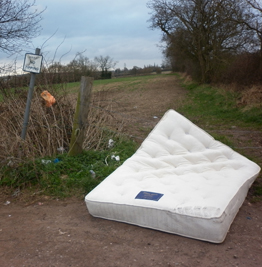Councils dealt with 936,000 fly-tipping incidents in 2015/16, a 4 per cent increase on the previous year, according to the latest figures from the Department for the Environment (Defra).
The estimated cost of clearance of fly-tipping to local authorities in England in 2015/16 was nearly £50m, a decrease of 0.3 per cent (£143,000) from the clearance costs reported in 2014/15. Incidents involving the Environment Agency or cleared by private landowners are not included.
Just over two thirds (67 per cent) of fly-tips involved household waste, an increase of 6.5 per cent from 2014-15; as in previous years, most incidents were on highways. A third of all incidents consisted of a quantity of material equivalent to a ‘small van load’. The second largest size category for fly-tipping incidents was a ‘car boot’, which accounted for 29 per cent of total incidents by size.
Comments
At the Local Government Association (LGA) Environment spokesperson Cllr Judith Blake said: “At a time when social care faces a funding gap of at least £2.6 billion by 2020 and councils’ overall funding shortfall is predicted to reach £5.8 billion within three years, local authorities are having to spend a vast amount each year on tackling litter and fly-tipping. This is money that would be better spent on vital front line services. Litter and fly-tipping is environmental vandalism – it’s unpleasant, unnecessary and unacceptable.
“The Government has responded to our call for councils to be able to apply Fixed Penalty Notices for small scale fly-tipping – and this is a big step in the right direction. We need a new streamlined system which helps councils – one that is nimble, flexible and effective. Not only does fly-tipping create an eyesore for residents, it is also a serious public health risk, creating pollution and attracting rats and other vermin.
“There are a number of additional changes that would help tackle littering and fly-tipping, including sharing more of the responsibility with product producers. This includes manufacturers providing more take-back services so people can hand in old furniture and mattresses when they buy new ones.”
In 2015/16 Westminster City Council removed 15,628 fly-tips ranging in size from a single black bag to ‘van load’ sizes. Councils across England can issue fixed penalty notices between £150 and £400 for “small-scale” offences. Nickie Aiken, Westminster City Council Cabinet Member for Public Protection said: “We have one of the best cleaning services in the country and we hope that these new fines send a strong message to the minority who think it is acceptable to fly tip and ignore our bins and refuse collections that this behaviour will not be tolerated. Our residents regularly complain about others who choose to illegally dump their rubbish. The vast majority of our residents and businesses are determined to keep their streets and neighbourhoods clean and we are working with them to create a cleaner greener city for all.”
Some background
Fly-tipping is defined as the illegal deposit of waste on land, contrary to Section 33(1)(a) of the Environmental Protection Act 1990. Local authorities and the Environment Agency have a responsibility in respect of illegally deposited waste.










